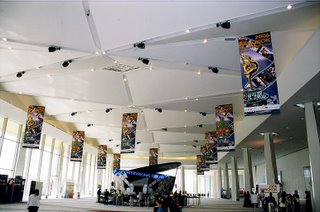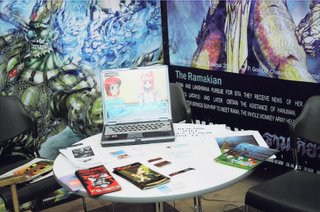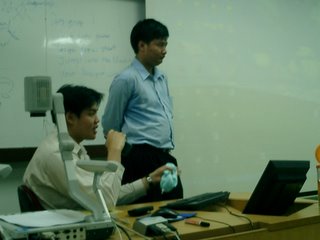Below are just a few pictures from in front of the Bangkok Film Market.



Since we have been invited by TAMMA (Thailand Animation and Multimedia Association) we have shared our booth with them. As noted below are some pictures from the booth which is highlighted by Ramayana an epic animation in the pre-production stages.




In this fair I would like to thank you Phot, A, Un, Dear, Rut, and Tuang for helping manage the booth with me.
Below here is just a small list of games and some screenshots that are shown in the fair which are listed by contribution in alphabetical order:
AIM

MMOG called GigOnline.
CloverSoft

A number of mobile phone games including Puzzle Warrrior.
Flying Pig Studio

Just for laughs!
GameSquare

Two mobile phone games - HellZone and CardWarrior
Imagimax

A collage of CG works from AAA titles such as Ninja Gaiden (XBOX) and etc. combined with video clips or an assorted of video games.
Iyara

PanPan3D a 3D action game for kids.
Look-kid

A collage of animation and video capture of their latest 3D Fighting PC game - Yuth which is adapted from a popular local manga.
MFEC

The latest technical demo of a PC - 3D engine under development.
PicSoft

A video showcasing how to play DiscDevil - a PC game that uses a camera system for player input.
Pinnacle

The demo shows TaiOnline their latest 3D MMOG game on the PC platform.
Polygon Devices

An example of GeoBuilder, a generic 3D world editor/level design tool and Tarot Reader - a future prediction software.
PromptNow

A demo of their dancing rhythm-based PC game is shown.
Sanuk Software

A collection of past projects done with many clients from a various number of companies.
StudioGu

A screenshot from the Interactive Novel game Angel's Tale that is on the PC platform.





